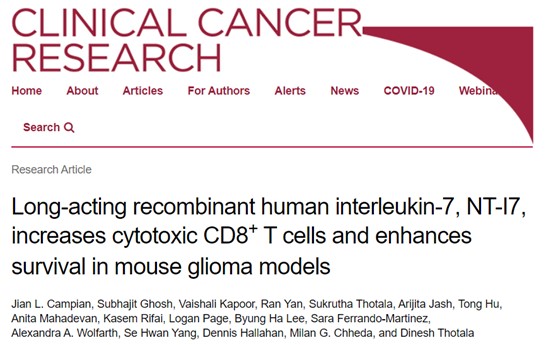NeoImmuneTech said it released preclinical results of NT-I7 in mouse models of glioblastoma (GBM) in Clinical Cancer Research, a major oncology journal published by the American Association for Cancer Research (AACR).
NeoImmuneTech is developing NT-I7 as a T cell amplifier immunotherapy.

The preclinical study was the basis for a phase 1/2 trial, presented with improved survival at the Society for Immunotherapy of Cancer (SITC) meeting and the Society for Neuro-Oncology (SNO) last year.
At the time, the phase 1 study results showed that the median progression-free survival (PFS) of the NT-I7 combination therapy group was 11.6 months versus 5.3 months with the standard treatment among GBM patients who had poor prognosis (MGMT unmethylated).
Also, the one-year or longer survival rate of the NT-I7 combo group was 94 percent versus 25 percent of the standard care group.
According to the latest preclinical results published in Clinical Cancer Research, the administration of NT-I7 amplified lymphocytes. When combined with chemotherapy/radiation, NT-I7 improved the survival rate significantly. In addition, it raised the ratio of CD8T cells that kill cancer cells directly to regulatory T (Treg) cells that suppress immunity in the tumor microenvironment.
the NT-I7 study results drew attention from the Clinical Cancer Research, NeoImmuneTech said scholars and industry officials would pay more attention to clinical tests of NT-I7 in GBM.
After presenting trial data at the SITC meeting last year, NeoImmuneTech received an urgent invitation to attend the annual Cytokine-Based Cancer Immunotherapies Summit in Boston.
Dr. Jian Li Campian of the Mayo Clinic and Principal Investigator of this study said, “The standard of care for GBM patients is radiation and TMZ, a treatment regimen which causes severe prolonged lymphopenia that is associated with lower patient survival.”
NT-I7 proved to correct this treatment-related lymphopenia in the study, and this potential is “extremely promising in the pursuit to improve outcomes for patients with GBM,” she said.
NeoImmuneTech CEO Yang Se-hwan said the company was actively interacting with experts in the U.S. as their interest in NT-I7 studies grew.
“We will keep presenting results from clinical studies for cancers with limited treatment options, such as GBM,” he said.

